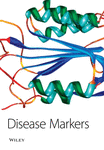TNF-α, TNF-β, IL-6, and IL-10 Polymorphisms in Patients with Lung Cancer
Abstract
Apart from cigarette smoking, genetic factors seem to be of importance in the development of lung cancer. The present case-control study investigated frequencies of five inflammatory response gene polymorphisms (TNF-α-308, TNF-β-Intron1-252, IL-6-174, IL-10-819 and IL-10-1082) in patients with lung cancer and controls. The study population consisted of 117 patients with lung cancer (77 patients with NSCLC, including 40 Squamous Cell Carcinoma and 26 Adenocarcinoma, and 40 patients with SCLC), 117 matched controls without pulmonary disease and 243 healthy individuals (population control). Genotype analyses revealed no difference in genotype frequencies using matched-pair analysis. However, in comparison to the population control, the IL-10-1082 genotypes carrying the G allele appeared with higher frequency in the SCLC group (p = 0.006) [SCLC: 84.6%, population controls: 64.6%]. This yields an odds ratio of 3.01 for SCLC (95% CI = [1.21, 7.48]). No associations were seen for all other polymorphisms analysed. The study raises the possibility of a correlation between the IL-10-1082_G allele and the presence of SCLC in a German population. The functional IL-10-1082 polymorphism correlates with altered IL-10 levels and might influence lung cancer susceptibility by altered inflammatory responses in the airways.




